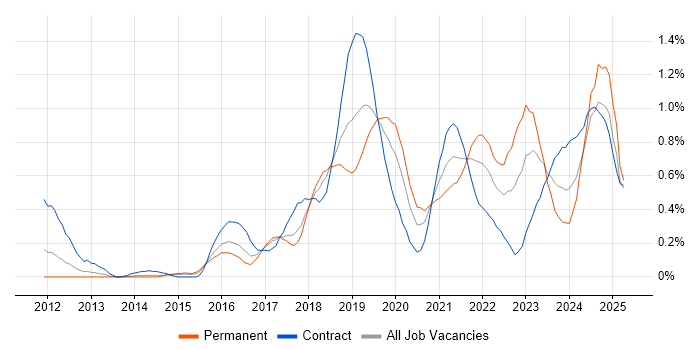Microsoft Azure SQL Database (formerly SQL Azure)
Berkshire > Reading
The table below provides summary statistics and salary benchmarking for jobs advertised in Reading requiring Azure SQL Database skills. It covers permanent job vacancies from the 6 months leading up to 6 January 2026, with comparisons to the same periods in the previous two years.
|
|
6 months to
6 Jan 2026 |
Same period 2025 |
Same period 2024 |
| Rank |
48 |
63 |
96 |
| Rank change year-on-year |
+15 |
+33 |
+23 |
| Permanent jobs citing Azure SQL Database |
1 |
13 |
4 |
| As % of all permanent jobs in Reading |
0.17% |
1.72% |
0.39% |
| As % of the Database & Business Intelligence category |
1.64% |
8.33% |
2.07% |
| Number of salaries quoted |
0 |
6 |
3 |
| 10th Percentile |
- |
- |
- |
| 25th Percentile |
- |
£53,688 |
£56,250 |
| Median annual salary (50th Percentile) |
- |
£60,813 |
£62,500 |
| Median % change year-on-year |
- |
-2.70% |
-16.67% |
| 75th Percentile |
- |
£65,938 |
£76,250 |
| 90th Percentile |
- |
£66,250 |
£80,750 |
| Berkshire median annual salary |
- |
£62,500 |
£62,500 |
| % change year-on-year |
- |
- |
-16.67% |
Azure SQL Database falls under the Databases and Business Intelligence category. For comparison with the information above, the following table provides summary statistics for all permanent job vacancies requiring database or business intelligence skills in Reading.
| Permanent vacancies with a requirement for database or business intelligence skills |
61 |
156 |
193 |
| As % of all permanent jobs advertised in Reading |
10.30% |
20.66% |
18.61% |
| Number of salaries quoted |
30 |
72 |
95 |
| 10th Percentile |
£42,500 |
£45,000 |
£36,000 |
| 25th Percentile |
£53,750 |
£52,500 |
£50,075 |
| Median annual salary (50th Percentile) |
£63,000 |
£66,250 |
£57,500 |
| Median % change year-on-year |
-4.91% |
+15.22% |
-11.54% |
| 75th Percentile |
£74,063 |
£85,000 |
£81,250 |
| 90th Percentile |
£85,375 |
£112,500 |
£86,500 |
| Berkshire median annual salary |
£63,000 |
£70,000 |
£60,000 |
| % change year-on-year |
-10.00% |
+16.67% |
-7.69% |
Azure SQL Database
Job Vacancy Trend in Reading
Historical trend showing the proportion of permanent IT job postings citing Azure SQL Database relative to all permanent IT jobs advertised in Reading.
Azure SQL Database
Salary Trend in Reading
Salary distribution trend for jobs in Reading citing Azure SQL Database.
Azure SQL Database
Co-Occurring Skills & Capabilities in Reading by Category
The following tables expand on the one above by listing co-occurrences grouped by category. They cover the same employment type, locality and period, with up to 20 co-occurrences shown in each category:


